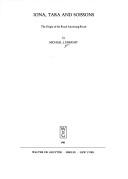| Listing 1 - 2 of 2 |
Sort by
|

ISBN: 3110106280 3110855518 0899251188 9783110855517 9780899251189 9783110106282 Year: 2011 Volume: 17 Publisher: Berlin Boston
Abstract | Keywords | Export | Availability | Bookmark
 Loading...
Loading...Choose an application
- Reference Manager
- EndNote
- RefWorks (Direct export to RefWorks)
Coronations --- Unction --- Couronnements --- Onction --- History --- France --- Kings and rulers --- Histoire --- Rois et souverains --- Royauté sacrée. Europe. 400-800. --- Koningschap (Sacraal). Europa. 400-800. --- Unction. --- Annointing --- Anointing --- Sacramentals --- Holy oils --- Crowning of sovereigns --- Pageants --- Rites and ceremonies --- Crowns --- History. --- Coronation --- Kings and rulers. --- Coronations - France - History --- France - Kings and rulers
Book
ISBN: 1575064324 9781575064321 9781575064314 1575064316 Year: 2021 Publisher: University Park, PA
Abstract | Keywords | Export | Availability | Bookmark
 Loading...
Loading...Choose an application
- Reference Manager
- EndNote
- RefWorks (Direct export to RefWorks)
What do rituals have to do with knowledge? Knowledge by Ritual examines the epistemological role of rites in Christian Scripture. By putting biblical rituals in conversation with philosophical and scientific views of knowledge, Johnson argues that knowing is a skilled adeptness in both the biblical literature and scientific enterprise. If rituals are a way of thinking in community akin to scientific communities, then the biblical emphasis on rites that lead to knowledge cannot be ignored. Practicing a rite to know occurs frequently in the Hebrew Bible. YHWH answers Abram's skepticism-"How shall I know that I will possess the land?"-with a ritual intended to make him know (Gen 15:7-21). The recurring rites of Sabbath (Exod 31:13) and dwelling in a Sukkah (Lev 23:43) direct Israel toward discernment of an event's enduring significance. Likewise, building stone memorials aims at the knowledge of generations to come (Josh 4:6).Though the New Testament appropriates the Torah rites through strategic reemployment, the primary questions of sacramental theology have often presumed that rites are symbolically encoded. Hence, understanding sacraments has sometimes been reduced to decoding the symbols of the rite. Knowledge by Ritual argues that the rites of Israel, as portrayed in the biblical texts, disposed Israelites to recognize something they could not have seen apart from their participation. By examining the epistemological function of rituals, Johnson's monograph gives readers a new set of questions to explore both the sacraments of Israel and contemporary sacramental theology.
Sacraments. --- Rites and ceremonies. --- Knowledge, Theory of (Religion) --- Epistemology, Religious --- Religious epistemology --- Religious knowledge, Theory of --- Religion --- Theology, Doctrinal --- Ceremonies --- Cult --- Cultus --- Ecclesiastical rites and ceremonies --- Religious ceremonies --- Religious rites --- Rites of passage --- Traditions --- Ritualism --- Manners and customs --- Mysteries, Religious --- Ritual --- Church --- Grace (Theology) --- Rites and ceremonies --- Philosophy --- Sacraments --- Théorie de la connaissance (christianisme) --- Théorie de la connaissance (religion) --- Rites et cérémonies. --- Sacrements. --- Efficacité des sacrements --- Théologie des sacrements --- Théologie sacramentaire --- Vie sacramentelle --- Pastorale liturgique et sacramentelle --- Sacramentaux --- Sacrements --- Sacrements et unité chrétienne --- Vie chrétienne --- Baptême --- Confirmation (sacrement) --- Eucharistie --- Mariage (sacrement) --- Onction des malades --- Ordre (sacrement) --- Pénitence --- Rites et cérémonies --- Théologie dogmatique --- Cérémonial --- Cérémonial religieux --- Cérémonies --- Cérémonies et rites --- Cérémonies et rituels --- Cérémonies religieuses --- Religions --- Rites --- Rites et cérémonies (ethnologie) --- Rites et cérémonies (religion) --- Rites et cérémonies religieux --- Rites religieux --- Ritualisme --- Ritualité --- Rituel religieux --- Rituels --- Rituels et cérémonies --- Rituels religieux --- (féodalité) --- (anthropologie) --- (communion solennelle) --- Contribution à la théorie de la connaissance religieuse --- Connaissance religieuse, Théorie de la --- Théorie de la connaissance religieuse --- Théorie de la connaissance --- Agnosticisme --- Analogie (religion) --- Dieu --- Foi et raison --- Théorie de la connaissance (bouddhisme) --- Théorie de la connaissance (christianisme) --- Théorie de la connaissance (hindouisme) --- Théorie de la connaissance (islam) --- Théorie de la connaissance (jaïnisme) --- Transmission spirituelle --- Christianisme --- Philosophie chrétienne --- Théorie de la connaissance (religion) --- droit canonique --- Liturgie --- Aspect religieux --- Dédicace --- Cérémonies et fêtes --- Cognoscibilité --- Coutumes et pratiques --- Culte --- Danse --- Lieux sacrés --- Vêtements religieux --- Abattage rituel --- Autels --- Écoles --- Églises --- Entreprises --- Exorcisme --- Fêtes religieuses --- Franc-maçonnerie --- Hindouisme --- Hommage (féodalité) --- Iconophagie --- Imposition des mains --- Bals de pureté --- Inaugurations --- Incantations --- Indiens d'Amérique --- Jeux olympiques --- Judaïsme --- Marche sur le feu --- Monastères --- Objets rituels --- Ordination --- Bouddhisme --- Paraliturgies --- Possession (anthropologie) --- Processions --- Profession de foi (communion solennelle) --- Profession religieuse --- Protocole --- Pureté rituelle --- Repas rituels --- Rites d'initiation --- Rites de fondation --- Cannibalisme --- Rites de passage --- Rites et cérémonies agraires --- Rites et cérémonies de la naissance --- Rites et cérémonies du mariage --- Rites et cérémonies funéraires --- Rites et cérémonies interreligieux --- Rites et cérémonies militaires --- Rites et cérémonies politiques --- Rites et cérémonies préhistoriques --- Cérémonie du thé --- Sacrifice --- Saut du Gol --- Serments --- Transe --- Translation de reliques --- Védisme --- Violence rituelle --- Commémorations --- Consécration --- Défilés --- Don et contre-don --- Moeurs et coutumes
| Listing 1 - 2 of 2 |
Sort by
|

 Search
Search Feedback
Feedback About UniCat
About UniCat  Help
Help News
News